
Mohammad Ismail Khan is an Afghan former politician who served as Minister of Energy and Water from 2005 to 2013 and before that served as the governor of Herat Province. Originally a captain in the national army,he is widely known as a former warlord as he controlled a large mujahideen force,mainly his fellow Tajiks from western Afghanistan,during the Soviet–Afghan War.
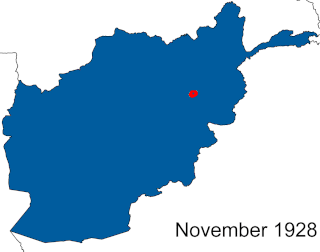
The Afghan Civil War was fought from 14 November 1928 to 13 October 1929. Rebelling,and subsequently governing Saqqawist (Saqāwīhā) forces under Habibullāh Kalakāni fought against various opposing tribes and rival monarchs in the Kingdom of Afghanistan,among whom Mohammed Nādir Khān eventually achieved a preponderant role. Despite early successes,such as the capture of Kabul and defeat of Amanullah Khan on 17 January 1929 or the capture of Kandahar on 3 June,the Saqqawists were eventually deposed by anti-Saqqawist forces led by Nadir on 13 October 1929,leading to Nadir's ascension as King of Afghanistan,who ruled until his assassination on 3 November 1933.

Ghazni,historically known as Ghaznain (غزنين) or Ghazna (غزنه),also transliterated as Ghuznee,and anciently known as Alexandria in Opiana,is a city in southeastern Afghanistan with a population of around 190,000 people. The city is strategically located along Highway 1,which has served as the main road between Kabul and Kandahar for thousands of years. Situated on a plateau at 2,219 metres (7,280 ft) above sea level,the city is 150 kilometres (93 mi) south of Kabul and is the capital of Ghazni Province. The name Ghazni drives from the Persian word ganj ‘treasure’.

Ghazni is one of the 34 provinces of Afghanistan,located in southeastern Afghanistan. The province contains 19 districts,encompassing over a thousand villages and roughly 1.3 million people,making it the 5th most populous province. The city of Ghazni serves as the capital. It lies on the important Kabul–Kandahar Highway,and has historically functioned as an important trade center. The Ghazni Airport is located next to the city of Ghazni and provides limited domestic flights to Afghanistan's capital,Kabul.
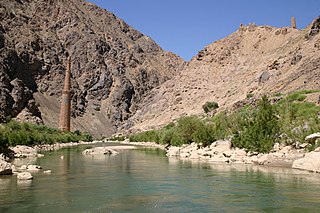
Ghōr,also spelled Ghowr or Ghur,is one of the thirty-four provinces of Afghanistan. It is located in the western Hindu Kush in central Afghanistan,towards the northwest. The province contains eleven districts,encompassing hundreds of villages,and approximately 764,472 settled people. Firuzkoh is the capital of the province.
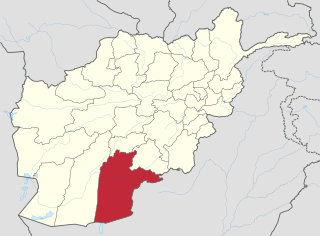
Kandahār is one of the thirty-four provinces of Afghanistan,located in the southern part of the country,sharing a border with Pakistan,to the south. It is surrounded by Helmand in the west,Uruzgan in the north and Zabul Province in the east. Its capital is the city of Kandahar,Afghanistan's second largest city,which is located on the Arghandab River. The greater region surrounding the province is called Loy Kandahar. The Emir of Afghanistan sends orders to Kabul from Kandahar making it the de facto capital of Afghanistan,although the main government body operates in Kabul. All meetings with the Emir take place in Kandahar,meetings excluding the Emir are in Kabul.

The Ghiljī also spelled Khilji,Khalji, or Ghilzai or Ghilzay (غلزی),are one of the largest Pashtun tribes. Their traditional homeland is Ghazni and Qalati Ghilji in Afghanistan but they have also settled in other regions throughout the Afghanistan-Pakistan Pashtun belt. The Khilji dynasty was a dynasty in Delhi Sultanate founded by Jalaluddin Khalji and expanded by Alauddin Khalji who were from Ghilji tribe. The modern nomadic Kochi people are predominantly made up of Ghilji tribes. The Ghilji make up around 20-25% of Afghanistan's total population.

General Muhammad Musa Khan was a Pakistan Army senior general who served as the 4th Commander-in-Chief of Pakistan Army from 1958 to 1966,under president Ayub Khan. Following his tenure as C-in-C of the Army,he later became a politician.
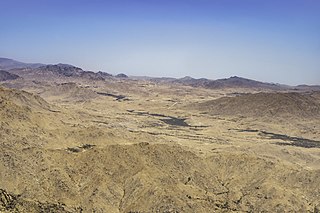
Jaghori is one of the main districts of the Ghazni province in Afghanistan. It is located in the highlands in the southern fringes of the Hazaristan region. It occupies 1,855 km2. in the upper Arghandab valley. The population is estimated to be around 560,000 in 2015. The district capital,Sange-e-Masha,is where major business transactions take place. The district is heavily dependent on agriculture,and migrant workers as the main sources of income. Other major marketplaces are in Ghojor and Anguri.
Malistan or Malestan,is a district in Ghazni province,Afghanistan. Its population,which is 100% Hazara,was estimated at 350,000 in 2009. The district capital is Mir Adina.
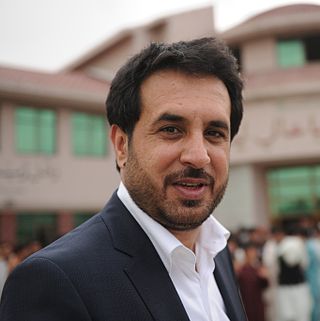
Asadullah Khalid is a politician in Afghanistan. He served as head of the National Directorate of Security (NDS),which is the domestic intelligence agency of Afghanistan. Before his appointment as the head of the NDS in September 2012,Khalid served as the Minister of Tribal and Border Affairs. Between 2005 and 2008,he was the Governor of Kandahar Province and prior to that as Governor of Ghazni Province (2002-2005). From 2018 until 2021 he was the Minister of Defense. Khalid is said to be affiliated with the Islamic Dawah Organisation of Afghanistan and has been noted as one of many loyalists of Afghan President Hamid Karzai.
Hajji Din Mohammad also known as Azizullah Din Mohammad is a politician in Afghanistan who served as the Governor of Nangarhar Province followed by Governor of Kabul Province. He is currently the Chairman of Peace and Development Islamic Party. He has been involved in the peace and reconciliation process between the Afghan Government and the Taliban and is currently the deputy of High Council for National Reconciliation. Haji Din Mohammad comes from a distinguished Pashtun family "Arsala" The Arsala family is part of the Jabar Khel. He is also the elder brother of late Hajji Abdul Qadir and Abdul Haq His great-grandfather,Wazir Arsala Khan,served as Foreign Minister of Afghanistan in 1869. One of Arsala Khan's descendants,Taj Mohammad Khan,was a general at the Battle of Maiwand. Another descendant,Abdul Jabbar Khan,was Afghanistan’s first Ambassador to Russia.

The Khugyani,Khogyani or Khogiani tribe is one of the Karlāṇītribes of the Pashtun people. The tribe originated in the Khogyani district in Nangarhar province of Afghanistan. The Khogyani District is in eastern Nangarhar province of Afghanistan,near the city of Jalalabad and the Kōh-i-Safēd.
Osman Osmani was appointed as the governor of Ghazni Province,Afghanistan in June 2008. He was succeeded by Musa Khan Ahmadzai in 2010. He was governor when Aafia Siddiqui was arrested outside his compound in Ghazni on July 17,2008.
The Andar are a Ghilji Pashtun sub-tribe. The Andar occupy nearly the whole of the extensive district of Shalgar south of Ghazni The Andar were traditionally known for their skill in the construction and maintenance of large karez. More concentrated in Ghazni Province,they have also a significant presence in Paktia. During the 19th century they joined in the Ghilji revolt and many were summarily sent into internal exile. Somewhat inexplicably,they allied themselves for a time with the Harakat-i Islami,during the anti-Soviet campaign. In fact,there were two Mujaheddin parties named Harakat-i Islami Afghanistan,the other and far more significant party was originally a 'united front' of mainly Hezb-i Islami and Jamiat-i Islami,that collapsed after only a few months,leaving behind a significant party that was in many ways a precursor to the present day Taliban movement. A majority of the Andar tribe were affiliated with this 'Harakt-i Islami' and it is notable that the leader of this united front and later party,Mawlawi Mohammad Nabi Mohammadi was Andar by tribe. Similarly,the senior Mawlawi Mansoor was Andar too. Mansoor's son Saifurrahman Mansoor was later an important figure and military leader in the Taliban movement.
The Sulaimankhel,or Suleiman Khel,are a Pashtun sub-tribe of the Ghilji tribe of Bettani confederation of Pashtuns,Mostly Nomadic People. In the early 20th century,the tribe was recognised as generally pastoral.
Haji Mali Khan is an Afghan Taliban politician,and former military commander. Khan has served as Deputy Chief of Staff of the Armed Forces since 4 March 2022. From 7 November 2021 to 14 March 2022,he served as governor of Logar Province. Prior to his governmental service,he was considered one of the leaders of the Haqqani network,a "semi-autonomous" offshoot of the Taliban.

The Ghazni offensive began on 10 August 2018,when Taliban fighters launched an assault on the city of Ghazni,Afghanistan's sixth largest city and one which has been culturally and strategically important for much of the country's history. The attack resulted in the deaths of hundreds of insurgents,soldiers,police,and civilians. The city also sustained large-scale property damage. The battle,occurring only weeks before Afghanistan's 2018 parliamentary election,was the largest since a three-day truce in June had raised hopes of peace talks.












